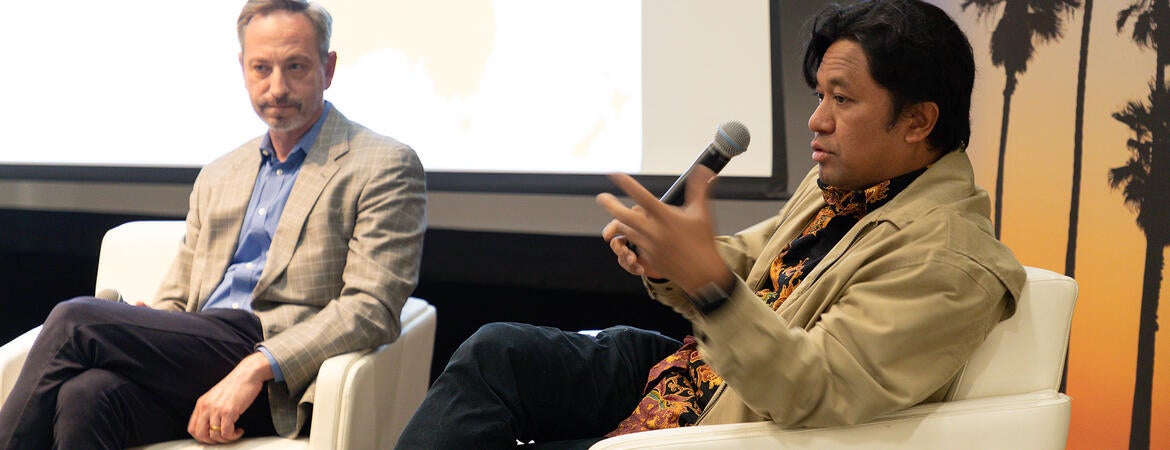College of Humanities, Arts, and Social Sciences

The UCR Palm Desert Center recently held the latest installment of the “Israel & Palestine: Possible Futures” series on Jan. 18, led by Professor of Religious Studies Michael Alexander and Associate Professor of Religious Studies Muhamad Ali. The lecture discussed historical roots, ethnicity, religion, and nationalism and served as a platform for diverse perspectives to explore potential positive routes in the region.
“Professor Muhamad Ali and I led a lively discussion regarding the roles of ethnicity, religion, and nationalism in identity formation and conflict, as well as what roles these might play in creating peace and stability,” said Alexander, who also serves as the Maimonides Chair of Jewish Studies. “These are complicated issues not easily encapsulated in slogans.”
The series, co-sponsored by the Maimonides Chair of Jewish Studies and the Program in Middle East and Islamic Studies, aims to clarify issues of conflict and invite differing perspectives and opinions for informed conclusions to indicate possible future outcomes rather than offer solutions.
“I think the lecture and conversation have positive impacts on increasing greater awareness about the histories and the memories, peace efforts, with few successes, but mostly failures, in bringing about the challenges to lasting solutions in Palestine,” Ali said.
According to Ali, the Jan. 18 lecture touched on the value of knowledge regarding the causes and conditions of the Israel-Palestine conflict, the role of religion, and the importance of listening, understanding, and participating in conversations of various opinions and narratives.
“The lecture was only one of the multiple conversations and panels inviting different speakers from scholarly and activist perspectives conducted within CHASS and campus, including some events hosted by the Center for Ideas and Society and student organizations,” Ali said.
Apart from the series, CHASS and UCR have hosted various events and lectures to discuss and contextualize the historical and ongoing conflict in Palestine to actively promote productive conversations, both in-person and virtually. Future events are listed on both the CHASS and UCR events calendar. Events are subject to change and more may be added.
“The campus conversation is an utterly necessary one,” Alexander said. “If an open and frank arena for discussions about Israel and Palestine, antisemitism and Islamophobia, and other deeply divisive issues of our day can’t be achieved on the college campus, it can’t be achieved anywhere.”
“Participants should talk their minds and speak up their hearts to convince others, but they need to be prepared to listen to others as well,” Ali said.
According to Alexander, students are also encouraged to take classes in Middle East and Islamic Studies and are invited to join his classes focused on Israel and world Jewry. Ali also encourages the UCR community to seek multiple sources and media such as books, essays, and news reports to learn more about the conflict.
Apart from talks and events, UCR has also encouraged students, staff, and faculty to utilize resources and services amid the Israel-Palestine conflict. Students can seek support through the Counseling and Psychological Services. Staff and faculty can access support services and additional resources through the Faculty and Staff Assistance Program.
“As we cultivate real conversations as opposed to propaganda and sloganeering, we will foster the dialogue necessary to create the more equitable conditions we all seek,” Alexander said.
To view future events, please visit the CHASS and UCR events calendar.
Available resources amid the Israel-Palestine conflict via an announcement by Provost And Executive Vice Chancellor Elizabeth Watkins can be found here.
Resources for further understanding and learning of the Israel-Palestine conflict suggested by Associate Professor of Religious Studies Muhamad Ali:
- https://greatergood.berkeley.edu/article/item/greater_good_resources_for_peace_and_conflict
- https://carnegieendowment.org/2021/04/29/approaching-peace-centering-rights-in-israel-palestine-conflict-resolution-pub-84397
- https://www.cartercenter.org/peace/conflict_resolution/israel-palestine/index.html
- https://guides.tricolib.brynmawr.edu/c.php?g=1357765&p=10025494
- https://www.nysed.gov/israeli-palestinian-crisis-resources-educators-caregivers-and-school-leaders
- https://www.pbs.org/wgbh/frontline/article/the-israeli-palestinian-conflict-and-shattered-dreams-of-peace/